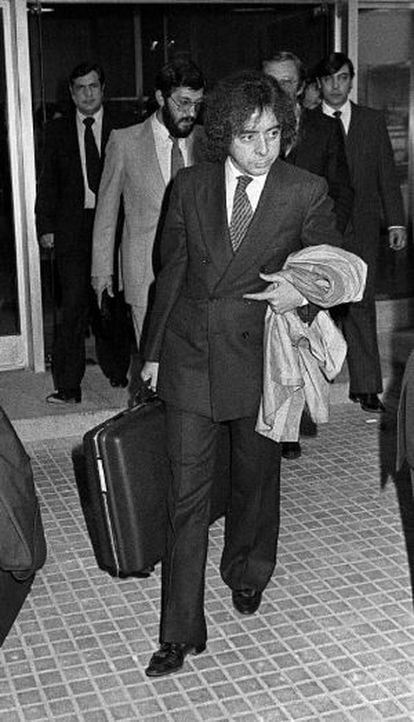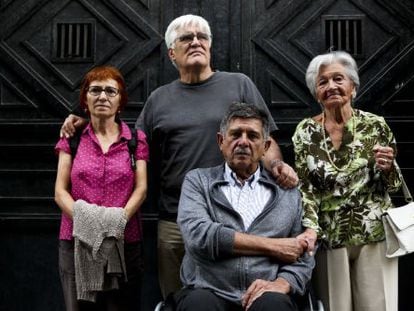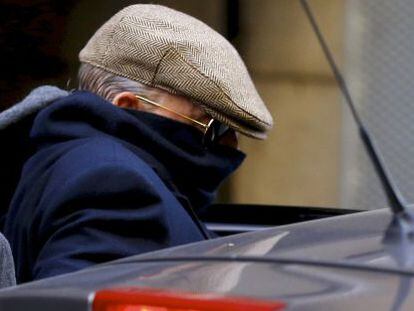Minister moves to strip notorious Franco-era torturer of extra pension
New Interior chief Fernando Grande-Marlaska exploring whether Antonio González Pacheco, known as “Billy the Kid,” can legally lose his silver medal and its economic benefits


Spain’s new Interior interior minister, Fernando Grande-Marlaska, has ordered a review of the police merit award given to Antonio González Pacheco, a notorious former police officer known as “Billy the Kid,” who is accused of committing torture during the dictatorship of Francisco Franco. As one of his first decisions in his role, Grande-Marlaska has requested the records and all documentation concerning the award, which was given in 1977 and increased the former policeman’s pension by 15%. According to government sources, the aim is to see whether it is legally possible to take away the recognition and its economic benefits.
González Pacheco picked up the nickname of Billy the Kid because he is reported to have had a habit of spinning his firearm on his finger in an intimidating manner, according to victims.
In 2013, Argentine Judge María Servini de Cubría issued an international arrest warrant for González Pacheco for 13 counts of torture, in an investigation into crimes committed by former officials during the Franco dictatorship. The case was brought to Buenos Aires by relatives of Franco’s victims after they ran into a legal dead end back in Spain. But in 2014, the Spanish High Court rejected the order, arguing the crimes were subject to a 10-year expiry date, which had been exceeded.
Billy the Kid received the award in recognition of his “extraordinary merits and services”
In the past few years, more victims have added new accusations of torture to the Argentine complaint. “He stank of alcohol. He was 28 years old, just two years older than me. And he enjoyed torturing. You could tell because in the middle of the fury, as he was kicking and punching you, there was a sign of pleasure, of satisfaction,” Felisa Echegoyen told EL PAÍS.
Chato Galante remembers another incident: “One time, I was handcuffed to the radiator in an office .... He arrived, kicked me and said, ‘You have had the honor of being kicked by Billy the Kid.’ He was very dangerous … there was absolute impunity. He would perform karate moves in front of you, kick you and say, ‘you are a big punching bag.’ He was a compulsive torturer. He enjoyed doing it. He would say, ‘I’m going to destroy you’.”
It was politician Rodolfo Martín Villa who signed the order in the Official State Gazette (BOE) on June 13, 1977 to award Billy the Kid a silver medal for police merit in recognition of his “extraordinary services.” Under a law passed during the dictatorship, the Interior Ministry, on the recommendation of the security general director, could hand out the recognition to “those who have observed the virtues of patriotism, loyalty and commitment to service to the highest degree.”
He was a compulsive torturer. He enjoyed doing it. He would say, ‘I’m going to destroy you’ Victim Chato Galante
In May, the Association for the Recovery of Historical Memory (ARMH) called on the former government of Prime Minister Mariano Rajoy to withdraw Billy the Kid’s award, arguing that the people who “believe, practice and defend democracy today” should not be forced to “pay with their taxes a prize given to a torturer.” González Pacheco, “who committed innumerable violations of human rights, does not deserve this distinction,” they added.
The ARMH also requested information on the “extraordinary merits and services” for which Billy the Kid received the award via the government’s transparency website. But on June 4, they were told by the head of police that offering this information would “violate his right to privacy” and could endanger him. According to the authorities, if the criminal acts became public knowledge, Billy the Kid could face “retaliation, putting in danger his integrity and that of other people.”
Honors and distinctions
According to lawyer Eduardo Ranz, the person who "awarded the recognition is the one who can withdraw it." Ranz, who has presented nearly 500 cases to remove plaques and Franco-related street names, says Billy the Kid's award is no different because "Article 15 of the Historical Memory Law can also be applied."
This article allowed public administrations to withdraw "emblems, insignia, plaques and other objects or commemorative mentions that celebrate, personally or collectively, the military uprising, Civil War and dictatorship repression."
Last year, Barcelona City Hall withdrew the city's gold medal given to Martín Villa, the last civilian governor of the Franco regime, in 1976.
English version by Melissa Kitson.












































